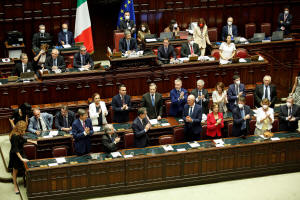Italian PM Draghi resigns after coalition deserts him
 Send a link to a friend
Send a link to a friend
 [July 21, 2022]
By Crispian Balmer, Giuseppe Fonte and Angelo Amante [July 21, 2022]
By Crispian Balmer, Giuseppe Fonte and Angelo Amante
ROME (Reuters) - Italian Prime Minister
Mario Draghi resigned on Thursday after his national unity government
fell apart, setting the country on course for an early election and
hitting financial markets.
Draghi, an unelected former central banker who has led a broad coalition
for 18 months, tendered his resignation in a meeting with President
Sergio Mattarella.
Mattarella's office said the head of state had "taken note" of the
resignation and asked Draghi to remain in a caretaker capacity.
Mattarella plans to meet the speakers of both houses of parliament on
Thursday afternoon. Political sources said earlier this week that he
would likely dissolve parliament and call early an election in October.
A bloc of conservative parties, led by the far-right Brothers of Italy,
looks likely to win a clear majority at the next election, a study of
opinion polls showed this week.
Draghi's coalition crumbled on Wednesday when three of his main partners
snubbed a confidence vote he had called to try to end divisions and
renew their fractious alliance.

The political crisis has up-ended months of stability in Italy, during
which Draghi had helped shape Europe's tough response to Russia's
invasion of Ukraine and had boosted the country's standing in financial
markets.
Draghi drew warm applause from lawmakers when he made a brief appearance
in the lower house of parliament on Thursday.
"Even central bankers have their hearts touched sometimes," he quipped
as he received the ovation.
Italian bond and stocks sold off sharply just as markets were bracing
for the first interest rate hike from the European Central Bank since
2011.
The Italian 10-year government bond briefly yield
shot up more than 20 basis points to 3.7%, although the yield was some
way off the 4%-plus levels seen in June.
"It is a big blow to Italy's ability to deliver policies and reforms
over the near term," said Lorenzo Codogno, head of LC Macro Advisers and
a former senior Italian Treasury official. "There will be delays and
disruptions with early elections, and most likely no budget by
year-end."
[to top of second column]
|

Attendees applaud Italy's Prime Minister Mario Draghi as he arrives
to address the lower house of parliament ahead of a vote of
confidence for the government after he tendered his resignation last
week in the wake of a mutiny by a coalition partner, in Rome, Italy
July 21, 2022. REUTERS/Remo Casilli

COALITION FRACTURES
Draghi had already tendered his resignation last week after one of
his partners, the populist 5-Star Movement, failed to back him in a
confidence vote on measures tackling the high cost of living.
Mattarella rejected the resignation and told him to go before
parliament to see if he could keep the broad coalition going until
the planned end of the legislature in early 2023.
In a speech to the Senate, Draghi had made a plea for unity and set
out a series of issues facing Italy ranging from the war in Ukraine
to social inequality and rising prices.
But the 5-Star once again decided not to back him, saying he had not
addressed their core concerns. In addition, the rightist Forza
Italia and League coalition parties decided to shun the vote,
pushing for a government without 5-Star.
In a sign of the tensions brought to the surface by the end of the
Draghi government, two ministers from Forza Italia said they would
leave the centre-right party.
Public administration minister Renato Brunetta and Mariastella
Gelmini, minister for regional affairs, both quit the party led by
Silvio Berlusconi.
(Additional reporting by Tommy Wilkes in London; Editing by Keith
Weir and Alison Williams)
[© 2022 Thomson Reuters. All rights
reserved.]
This material may not be published,
broadcast, rewritten or redistributed.
Thompson Reuters is solely responsible for this content.
 |